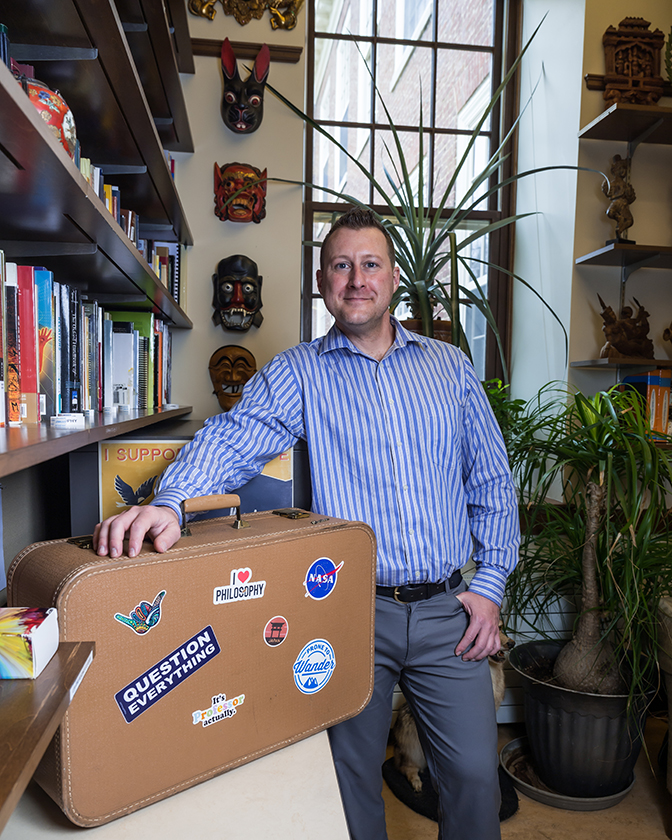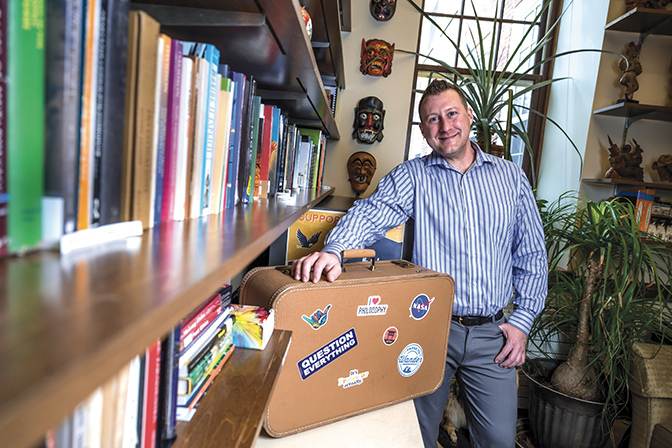Dr. Jarrod Brown ’04, assistant professor of philosophy, was 8 when his favorite hunting dog, a beagle named Bingosh, died having puppies.
“I was pretty distraught,” he said. “I climbed up on top of the chicken house to wonder why my little dog died.”
Death and the pain of childbirth, he remembered from his Old Regular Baptist upbringing, were punishments handed down from the original sin of Adam and Eve. But as he thought about it, he became dissatisfied with the answer.
“My little dog had never done anything to anybody, so it didn’t make sense that it should be punished,” Brown said. “I think that created the first seed of doubt in my mind.”
It all went down in a little place called Sharkey, Ky., a tobacco-growing community halfway between Lexington and Ashland, on the western edge of Central Appalachia. Brown hopped down from the chicken house and went inside to his mother, who was washing dishes.
“Mom,” he prodded, “is Jesus like Santa Claus?”
The future philosopher was full of questions like that, and his mother put down her wash rag to say only that it was something he would have to answer for himself and not to mention it in front of his grandparents.
His dad worked construction, and on the weekends the two of them would build fences, but in his free time, Brown was reading. He still has his copy of “The Teachings of the Compassionate Buddha,” edited by E. A. Burtt, that he bought for 35 cents at a thrift store when he was 12.
“It was the first time I realized there were other attempts to answer the perennial questions of human existence, like the meaning of life, what is wrong and right, what is the nature of humanity and its relationship to the universe,” Brown said. “[I read] anything I could get my hands on at the Rowan County Public Library.”
Later, in high school, an art teacher who was a Berea College alumnus took note of Brown’s inquisitive nature, his financial status and his potential and thought Berea would be a good fit. The teacher took him to campus for a convocation where Tibetan monks were creating a mandala.
That was just incredible for me. I had been reading about these sorts of things most of my life, and it was the first time I was able to speak to people and hear people talk about these ideas that I had just been reading about.
Dr. Jarrod Brown ’04
“That was just incredible for me,” Brown said. “I had been reading about these sorts of things most of my life, and it was the first time I was able to speak to people and hear people talk about these ideas that I had just been reading about.”
From that moment on, Brown knew Berea was the place for him. That dream of college, though, became imperiled as his questioning mind ran afoul of the local authorities. When the school administration brought in dogs to sniff out contraband among student belongings, Brown, sure of his rights and the doctrine of probable cause, led a walkout in protest. His conflict with the administration ultimately led him to drop out of high school during his senior year.
But before he did, Brown called the Berea College Admissions office to let them know his plans. He had great test scores and planned to get his GED. Brown was informed that to be admitted early, he would need to get letters of recommendation from the very administration he’d walked out on. Both the principal and the superintendent refused.
Without the letters, Brown was going to have to wait until the next admissions cycle to be reconsidered. In the meantime, he arranged lodging at a farmhouse in a neighboring county, where he could stay for free if he fed the cattle and looked after the land. Nearby was a sawmill, which provided him some income. For six months, he fed the cows, worked at the sawmill and read existential philosophy as he awaited news from Berea.
And news finally came. “I guess [associate director of Admissions] Chuck Morgan saw something,” he said. “I try to get together with him about once every semester because I’ve told him a whole lot of my life is owed to him taking a risk on me.”
Because of his experience at the sawmill, Brown was assigned to woodcraft for his labor position. He progressed from sanding items to crafting small stools to making the popular skittles game. Naturally, he majored in philosophy, a path his parents were skeptical of, but Brown allayed their concerns with thoughts of law school, though it was a path that never would materialize.
This path opened up other opportunities. Aside from a trip to Washington, D.C., when he was 16, Berea was as far away from Sharkey as Brown had ever been. Berea, though, had a study abroad program that allowed him to study in Malaysia. While there, he moved to a diverse area of the country where Buddhist and Hindu temples shared a street with a mosque.
“I spent a lot of time at the Buddhist and Hindu temples, made lots of friends, lots of connections, joined a Buddhist study group at the university,” he related. “It was a time where I was getting lots of exposure into these things that I felt like I had been pursuing and studying my entire life.”

This short stint in Malaysia only inflamed the young man’s wanderlust. He traveled back and forth from Berea to Asia, once through an internship with the World Affairs Council of Cincinnati, and another time to backpack through Southeast Asia. One summer, Brown studied puppetry in rural Japan.
He finished his degree, and his parents were happy when he secured a full-time position at Berea College as a program assistant in the Center for Learning, Teaching, Communication and Research (now the Center for Teaching and Learning). They thought he would settle down and buy a home, but Brown looked out into the wide world and realized he’d still never been to the birthplace of much of the philosophy he’d been studying.
“I said [to my parents], ‘I just bought a one-way ticket to India, and the job that I got pays $480 a month.
I will be back home after I have saved enough money to buy a return ticket.’”
He wouldn’t return to America for three years. The job at an Indian call center led to a better opportunity. Thanks to Brown’s background in education, he caught the attention of Krishnan Ganesh, who had made his fortune in Indian call centers. Ganesh was starting a new company called TutorVista, and he wanted Brown to serve as the academic director. The venture had big names attached to it, names associated with Amazon and McAfee. By 2012, the company had grown to 800 employees and a roster of 2,000 tutors. It was acquired by Pearson, owner of the Financial Times and book publisher Penguin Books, in 2013, when Brown received his “golden parachute.”
By 2016, when he joined the Berea College faculty, Brown had accomplished much, and one can read about all of it in his online biography at www.berea.edu/phi/faculty-and-staff/jarrod-brown. The short version is that while he was an internet executive, he went back to school at the University of Hawai‘i at Manoa and earned his master’s degree in philosophy and Ph.D. in comparative philosophy. When news that he had received the prestigious Jack Kent Cooke graduate scholarship reached his high school superintendent, she wrote him a letter saying, “I always knew you would do great things but worried what they would be.”
Berea is the only place that I’ve ever really felt at home. It’s the community. It’s the campus. It’s the people. It’s the students…there’s something deeply rewarding about what I do, and I’m really thankful to be able to do it.
Dr. Jarrod Brown ‘04
Among those great things, according to Brown, was coming home to Berea. “I had always hoped to land back in Berea,” he said. “Berea is the only place that I’ve ever really felt at home. It’s the community. It’s the campus. It’s the people. It’s the students. You make a lot more money as an internet executive than you do as an assistant professor at Berea College, but there’s something really deeply rewarding about what I do, and I’m really thankful to be able to do it.”
For the past four years, Brown’s research has been funded by NASA. The lone philosopher on a team of scientists is studying how Buddhism and culture affect land use in Vietnam. The goal is to provide a culturally appropriate response to climate change in that country.
“One of the ideas I imbibed at Berea was that you go out in the world, you find out all you can and you have
all these experiences, and then you bring them back home, and you share them with other people,” Brown said. “You illustrate that you can come from Sharkey and traipse all over the world.”



Very much good.
The link in the article to does not work 🙂
Samson,
Which link are you referring to?